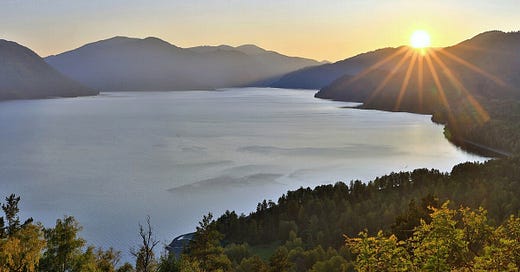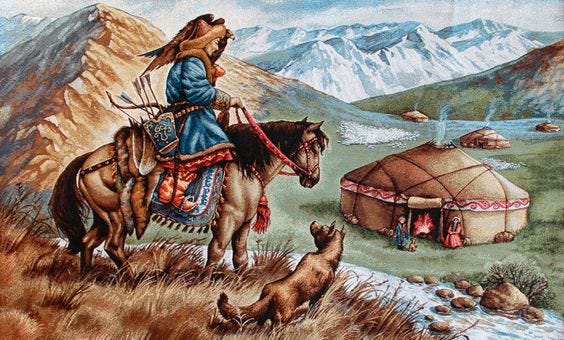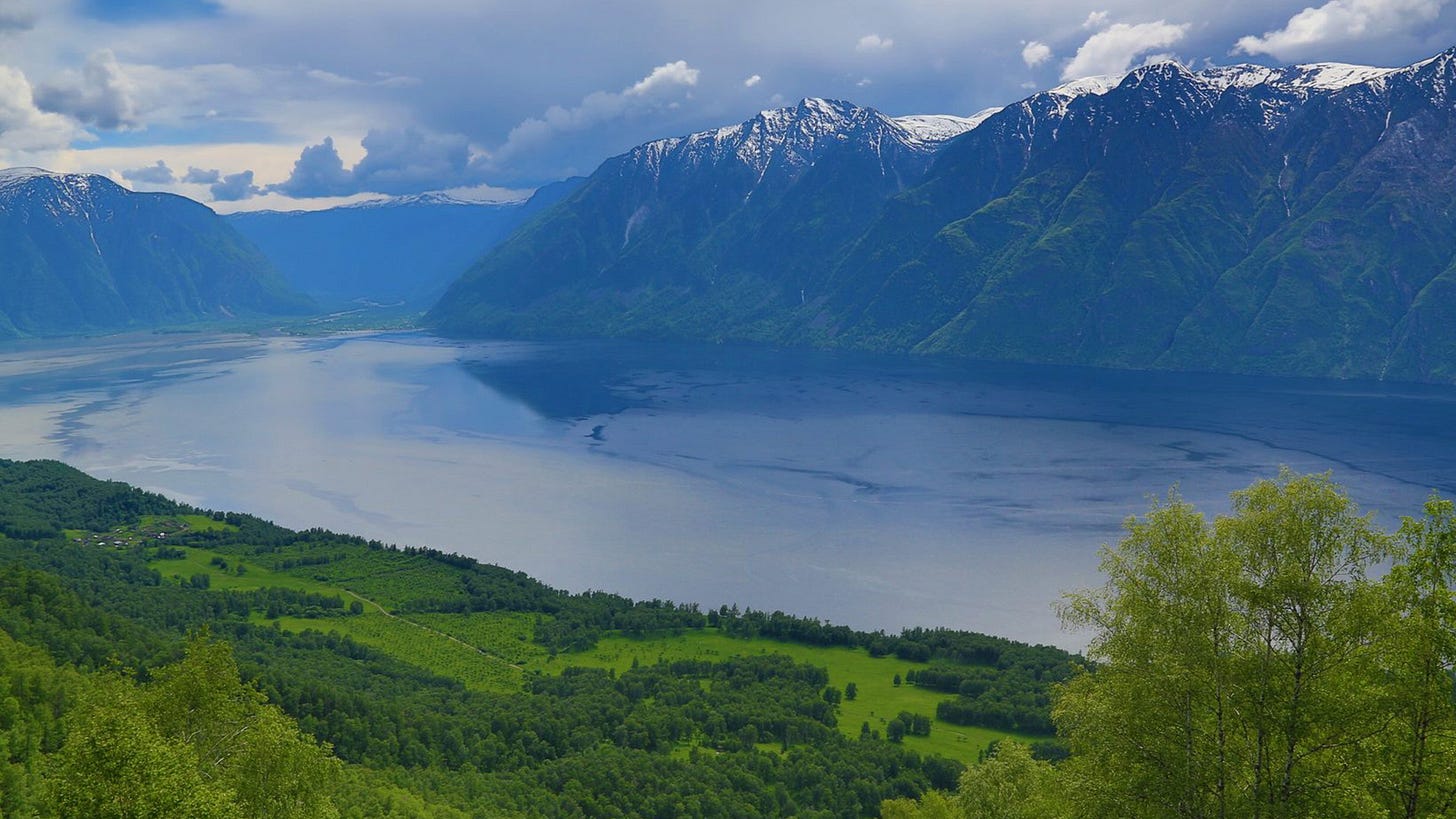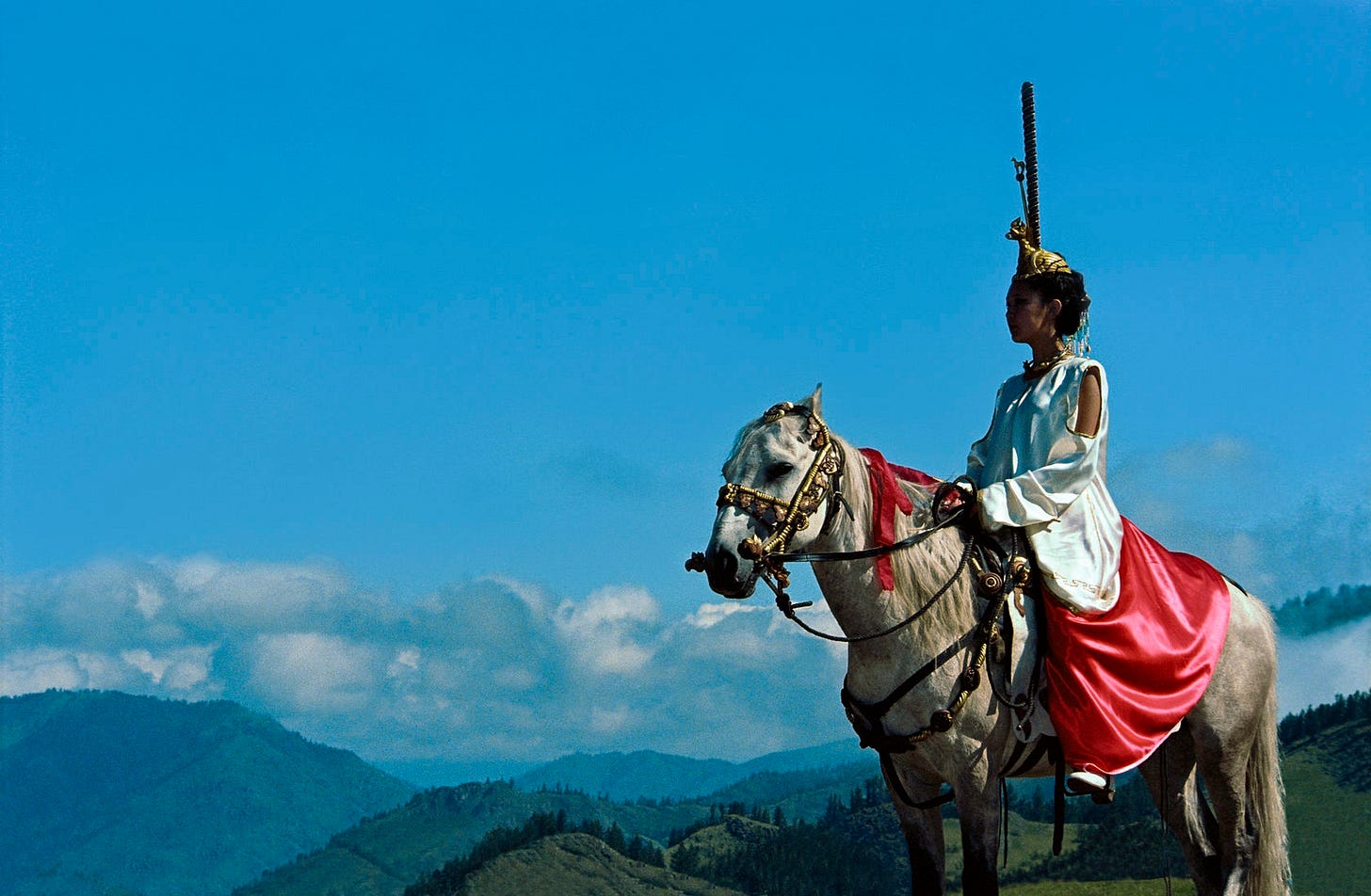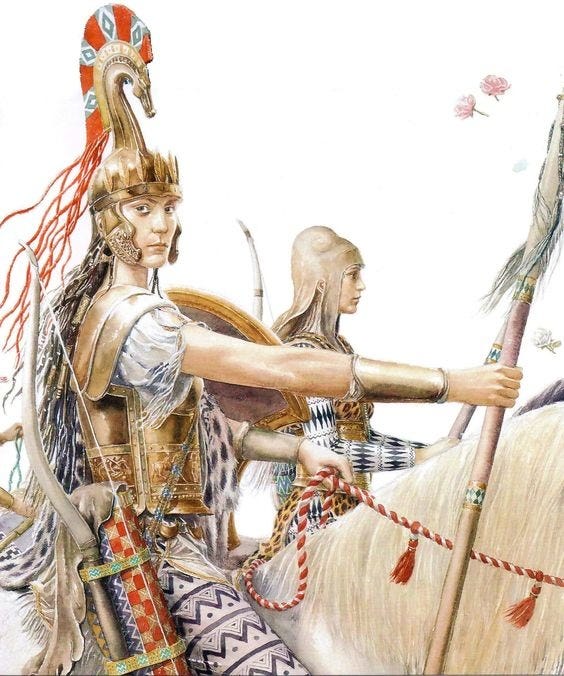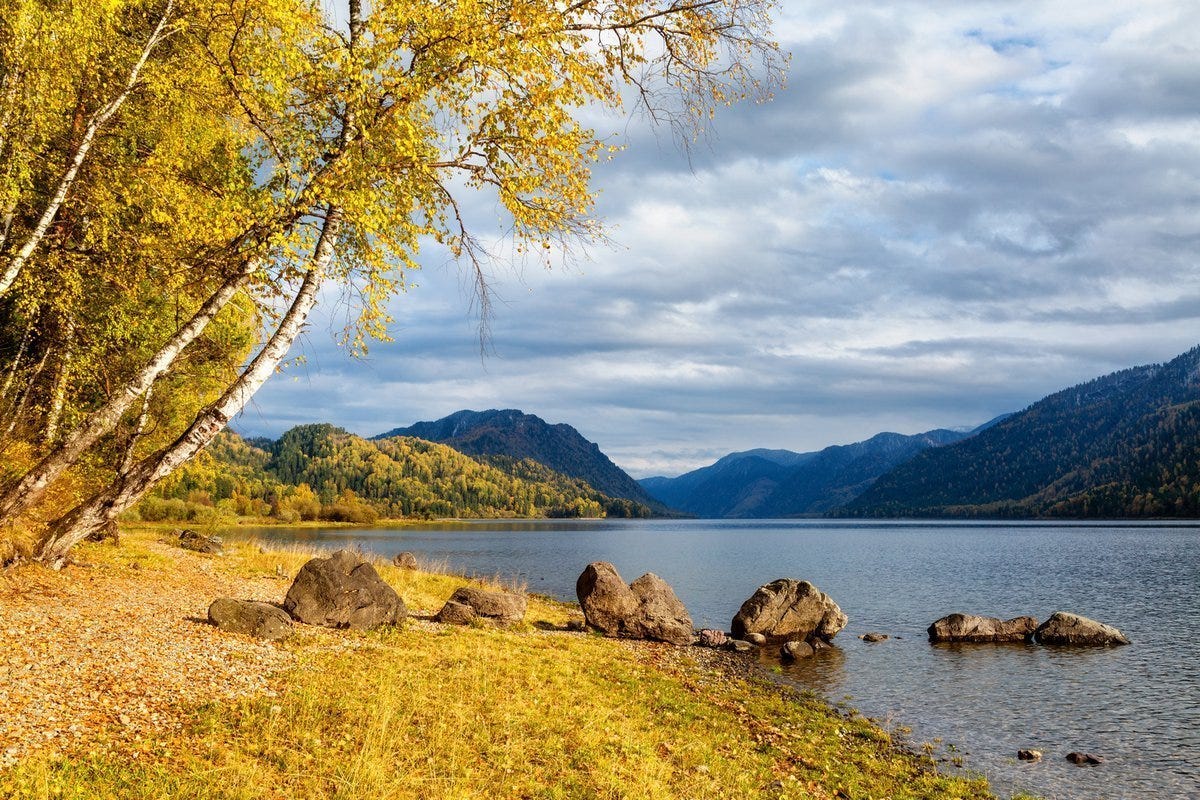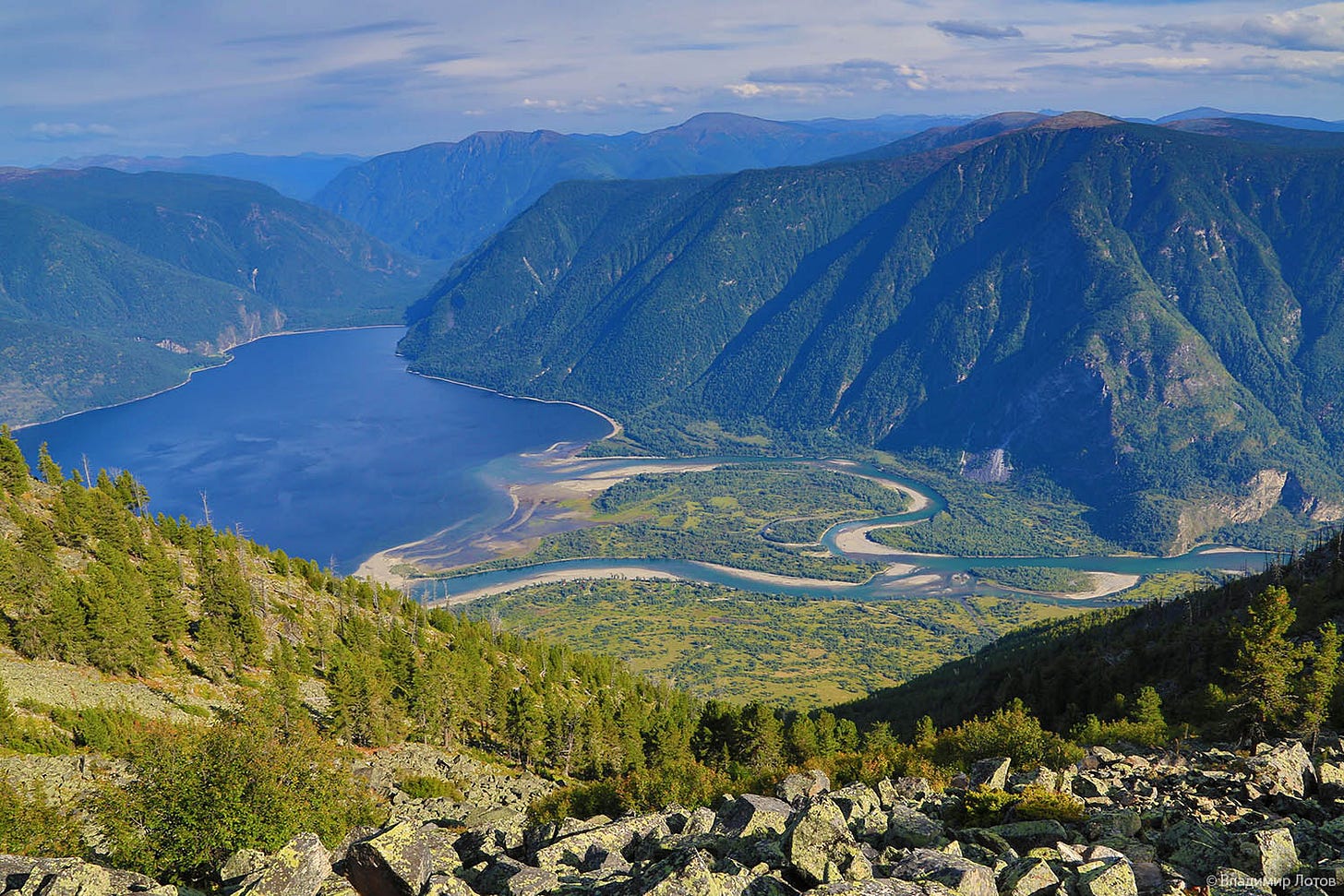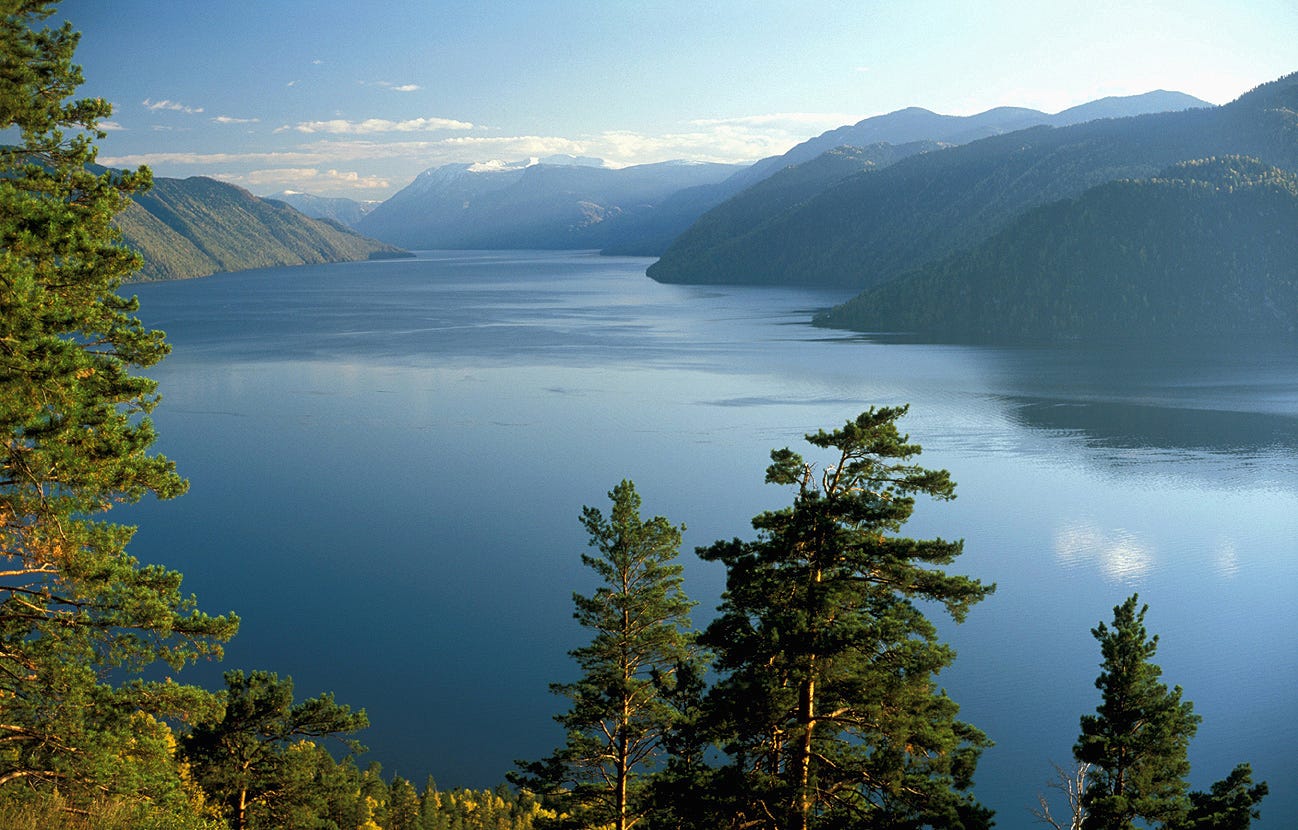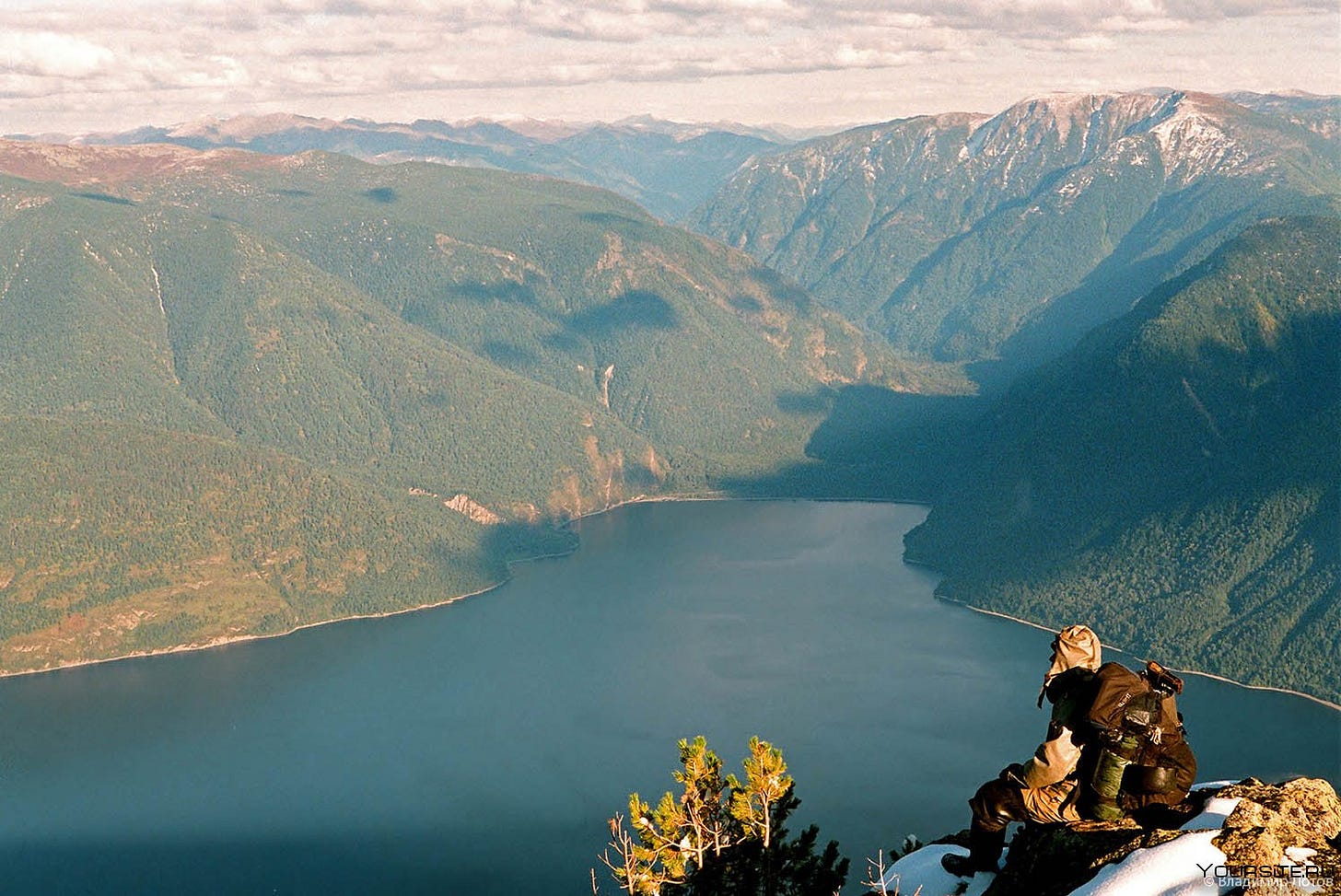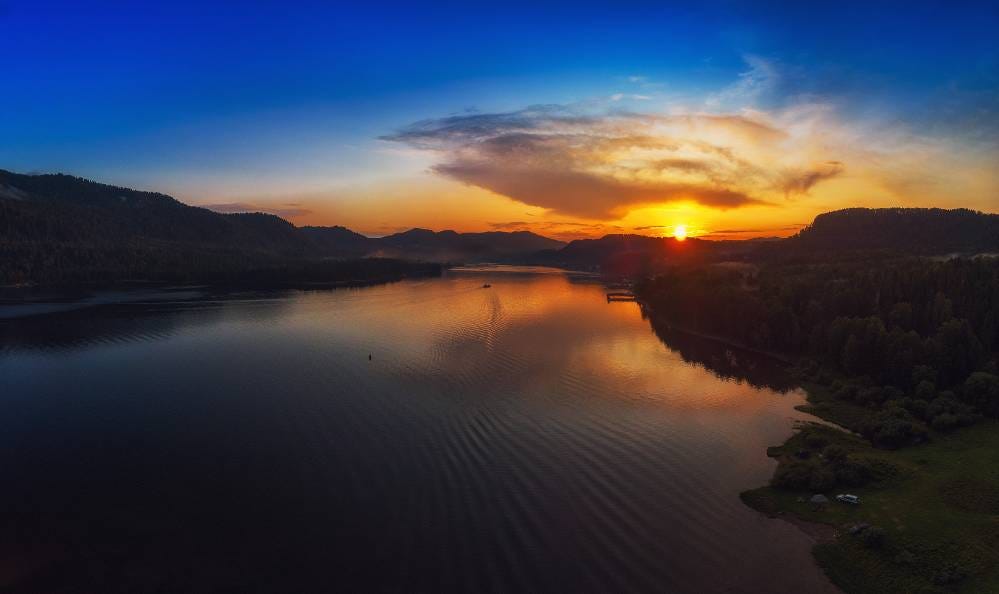Altaic Legends of the Golden Lake
Translations of Folk Tales and Mythology about Lake Teletskoye in the Altai Mountains
Preliminary note: For Gmail readers, this essay might be clipped due to size limitations. To read the entire essay simply click on “View entire message” at the bottom of the email, thanks.
Translator’s Introduction
Below are translations of eight different folk tales and myths about Lake Teletskoye, also known as the Golden Lake to the Teles, a Turkic speaking people and the region’s native inhabitants. Lake Teletskoye is a large alpine lake located in the heart of the Altai Mountains in Russia. Over 70 rivers feed into the lake, the largest being the Chulyshman. The lake is drained by the River Biya, which flows northwards, cutting a path through the Altai Mountains. In the lowlands near the city of Biysk, the Biya is joined by the Katun River, which also originates in the Altai Mountains, and together they form the Ob, one of Siberia’s great rivers which flows to the Kara Sea in the Arctic Oceans.
The stories largely fall into two categories, the first tells of how the lake was physically created in ancient times, and the second are fables, about people in unfortunate circumstances who realize that gold alone is not the answer to their problems. As far as I can tell, these stories were collected and published by Soviet ethnographers who studied the indigenous Altaic people. For similar content about the Caucasus, I would greatly recommend “Legends of the Caucasus” edited by David Hunt. This book has a large collection of Caucasian folk tales that were also recorded by Soviet ethnographers. For a similar origin story about Lake Issyk-Kol in Kyrgyzstan, the great alpine lake in the Tianshan Mountains, see my thread where I retell the myth found in Chingiz Aitmatov’s “The White Steamship.”
This post is a follow up to my essay about Russia’s expeditions to Lake Teletskoye in the 17th century and their conquest of the Altai Mountains, where I go into great detail on the history of the Lake Teletskoye and the Teles people.
The Golden Sword (Source)
They say that in distant times the location of the lake was a large plain which the River Chulyshman flowed through. How many abundant meadows were around it! Here the Teles people lived, headed by the magnificently rich Khan Tele. He had a great herd of cattle, a vast amount of gold, expensive silver furs and silk clothing. But most precious to him was his magical golden sword. Whenever Khan Tele went off to war he armed himself with this sword and never knew defeat.
The glory of Khan Tele’s wealth spread far beyond the limits of Altai. His friends were jealous of him, and his enemies dreamed of seizing his jewels and wealth. And one day the foreign Khan Bogdo assembled his force and unexpectedly attacked the lands of Tele. He robbed people and took them away to captivity. Tele then armed himself with his magical golden sword, mounted his horse with his trusted druzhina1 and rushed towards his enemies. Bogdo did not expect such a sudden onslaught.
His force trembled and asked to retreat. Bogdo himself was forced to surrender himself to the mercy of the victor. His weapons were taken, arms and legs bound, he was brought to the Altai tents. Bogdo begged not to be killed, for his life to be saved and to be released from captivity, and for this he promised a rich ransom, and also his eternal friendship.
The wife of Tele, Chulcha, was flattered by the gifts and convinced her husband to grant Bogdo’s request. Sometime later envoys arrived and brought to the feet of Khan Tele gifts for him and his wife. While handing over the gifts, the envoys assured Khan Tele of their eternal friendship and invited him to come as a guest to their lands.
Tele accepted the invitation. He began to collect his things for the trip. When everything was prepared for the departure, Khan went to his wife’s tent to say goodbye. Chulcha took the magical golden sword from the wall of the tent and wanted to arm her husband as she did before any expedition and campaign. But her husband refused and said, “I go to the camp of my friend, and not to the camp of an enemy. My sword is not needed. Wait one moon for me.”
Tele with his retinue and pack horses, loaded with gifts for Bogdo, headed out on their long journey. After a few days on the difficult road they encountered the armed warriors of Bogdo. How surprised Tele was when he was surrounded by the warriors and saw that instead of being honored, he was being treated as a captive enemy.
Bogdo, having treacherously taken Tele captive, beheaded him and his companions. And at that moment, as the head of the all too trusting Tele fell from his mighty shoulders, in the tent of his beloved wife Chulcha, the golden magical sword fell from its place. As it hit the ground it cut a chasm into the earth and formed a massive gaping abyss from the mountain of Kemetek to the mountain Kuporosnaya, and from the mountain Kuporosnaya to the mountains of the Altyn-Tuu and Toolok.
The beautiful Chulcha and her tent were now at the edge of the abyss. She already understood that her husband had suffered an unrecoverable misfortune, and bitterly she cried. From her large radiant eyes two unstoppable streams of hot tears poured forth. They poured so long and abundantly that they filled the entire abyss that was formed from the sword’s fall. This abyss, filled by the tears of the beautiful Chulcha, became Lake Teletskoye.
And in order for the lake to never dry out, and for the people to never forget the treachery of Khan Bogdo, Chulcha turned into the quick, high flowing stream, carrying clear transparent water from the Chulyshman. Mixing with the Chulyshman, Chulcha flows into the Altyn-Kol – Lake Teletskoye.
M. Zharkov, (Altai Pravda, 1957)
The Two Bogatyrs (Source)
Once at the spot of Lake Teletskoye there was a wide, miraculous valley, surrounded by snow white mountains. In these mountains lived two bogatyrs.2 For a long time peace could not exist between them. And the reason for this was the miraculous valley. Each of them greatly wanted to seize it. In the end, they became tired of arguing, and they came to an agreement that they will remain slient. Whoever first broke the silence would lose the right to ruling the miraculous valley.
A hundred days and a hundred nights passed, but the bogatyrs stubbornly remained silent. No one wanted to lose their right to rule the valley. And then one day, each sitting on their own mountain, they attempted to gesture to each other to negotiate. Suddenly before their eyes, out of nowhere, a woman appeared on the valley floor. The bogatyrs stared towards her and out of amazement they both cried out at the same time: “Oh, women!” With this exclamation thunder roared, lightning struck, and the women disappeared as suddenly as she appeared. Streams of water gushed from the sky and from the mountains, and a thick fog came down. And when the fog dissipated, in the place of the miraculous valley appeared a massive lake. The bogatyrs understand that they had both lost. They simultaneously ran from the mountains to the lake, hoping to touch the marvelous women as if she was in the water. From their powerful, gigantic force massive waves formed in the lake, which rolled in streams along the shores of the lake with the sound: “tele-tele.” This echo was heard by the bogatyrs and they thought it was the name of the women. As they said it, both were turned into winds. One blow on a lower course just above the water, while the other gushed higher. Still to this day they blow across the Teletskoye Lake: the “lower” and “higher” winds.
Journey to the Lowland Steppes (Source)
In distant times the Altaians lived in isolation from other peoples and had no communication with the outside world. They lived according to their own laws. The Altaians were ruled by a wise women named Kodrys. A rumor went around Altai that somewhere – in the foothills, there is a large steppe, which apparently was inhabited by different people who lived in abundance and had great wealth.
But one day clouds and thunder swept across Altai. There was great crop failure that continued for several years. A terrible famine arrived. The ruler of the Altai Kodrys assembled a council made up of the best people, of whom would decide – what is to be done? There were many proposals and disputes, but none of them were feasible. Kodrys suggested they collect all of the gold they had and then set off in a caravan to the steppes where they could trade their gold for bread with the people who lived there. Kondrys lead the caravan herself. She wanted to see the life on the steppes for herself. The caravan traversed the taiga, steep mountains and mountain rivers. In the end, they made it out of the mountains and arrived to the wide expenses of the steppe. Here people were farming and herding cattle. Kondrys told the steppe people about their poverty. But, to her surprise, she was told there was no bread, as there was also a crop failure on the steppe that had been ongoing for several years. They grieved and went further in search of bread.
The caravan and Kodrys spent much time and effort in search of bread, but everywhere there were bad harvests. By then Kodrys was convinced that the gold had lost its value. Losing strength, the caravan returned back home to the mountains. And upon returning, they saw a beautiful lake in the mountains. They tried persuading her not to expend the last of her strength, but she decided to head to the lake. Kodrys climbed the mountains and was fascinated by the view of the beautiful, clam lake, surrounded by forested cliffs. Kodrys took all of the gold from the caravan, tied it to her horse and sent the horse down from the peaks to the lake. She only shouted: “Why do my people need gold if I cannot buy them a handful of bread with it?” Since then the mountains have been called Altyn-Tuu, and the lake – Altyn-Kol.
The Sacrifice of Gold - http://altaiskoe.ru/legendy-o-teleckom-ozere
A hunter lived in the Altai Mountains. One day he departed on a hunt and ended up lost. He spent a long time trying to find the road back home, but was unsuccessful. At the end of the day, as the sun set, he realized he had gone in circles and had ended up on the same mountain. Tired, he lay down and fell asleep. Upon waking up, he saw before him a large nugget of gold. The hunter began to celebrate, but remembered how difficult it was to find the road home. “What good is this treasure to me if I do not know whether I will even live?” He decided to make the nugget a sacrificial victim to the mountain spirit who lived in the lake below. With the belief that the spirit will show him the direction home, the hunter threw the nugget into the water. Suddenly he received an insight. Without any difficultly he found the path which led him back to his home. Thus the lake was named Altyn-Kol, and the mountain where the hunter stayed – Altyn-Tuu.
The Bogatyr Sartykpai (Source)
In Altai lived the bogatyr Sartakpai. His scythe reached down to the ground. His brows were as thick as bushes. His muscles are as knotty as a knot in a birch tree, - cups can even be made out of them. But he was not happy, the honored bogatyr Sartakpai was not cheerful. Day and night he could hear the rivers of Altai cry as they squeezed through the stones blocking their path. Being thrown from stone to stone, the rivers were torn to shreds. Splintered into streams, they flowed to the sides of the mountains. Sartakpai was tired of seeing the tears of the Altai’s rivers, tired of hearing their incessant moans. And he thought he could give the waters of Altai a road to the Arctic Ocean. Sartakpai called for his son: “You, child, go to the south, and I will go to the north. The son Aduchi went to Mount Belukha, climbed to its peak, where the eternal snow lies, and began to look for a route for the river Katun. The bogatyr Sartakpai himself went to the east, to lake Yulu-Kol. With the finger of his right hand, Sartakpai touched the shore of Yulu-Kol, and with the indent formed by his finger the river Chulyshman flowed forth. But over this joyful murmur the Chulyshman Sartakpai heard crying in the Kosh-Agach Mountains. He put his left hand forth and with his finger he drew a path for the River Bashkaus. There Sartakpai stopped.
“Where is my son son Aduchi? Why does he not come to meet me? Fly to him, black woodpecker, and see where Aduchi-Mergan working.” Not far from Ust-Koksa he caught up with the strong Aduchi. He was drawing the Katun further and further to the west.
“What are you doing?” shouted the woodpecker. “Your father is waiting for you at Artybash. The son then turned the Katun to the northeast. The woodpecker hurried back to Sartakpai. “Honored bogatyr, your son made a mistake: he began to draw the river to the west, and now has turned it back to the east. He will be here in three days. Sartakpai waited for his son for three days, while holding his finger in the Artybash valley the entire time. During this time Lake Teletskoye formed under his finger. The father formed the Biya River from the Lake Teletskoye, and the son Aduchi quickly ran from the Katun. He was not one step behind his mighty father. Both rivers eventually merged, the Biya and the Katun, forming the wide Ob. And this river carries the waters of the Altai to the distant Arctic Ocean.
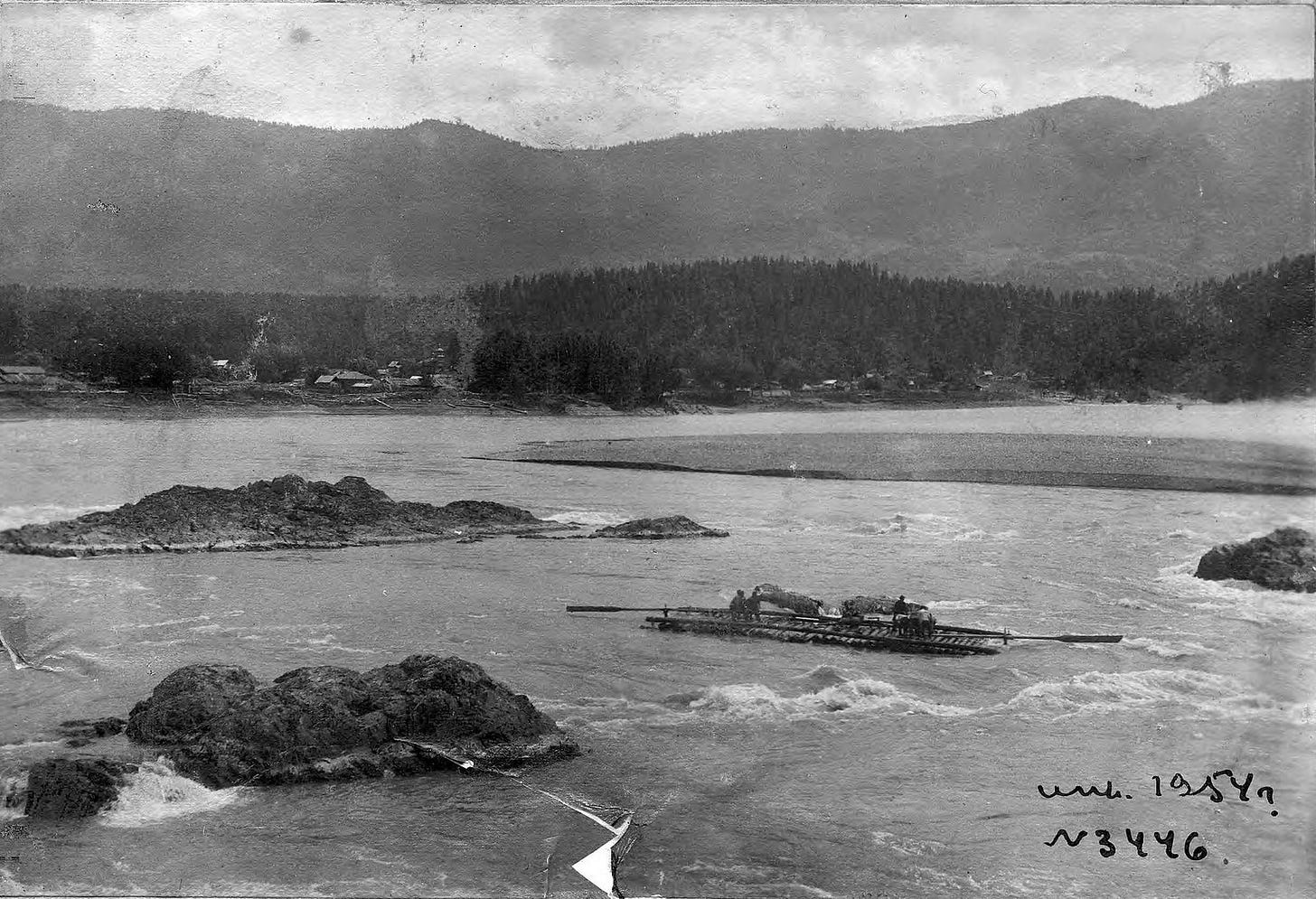
Khazila and Chinat (Source)
Long, long ago, one of the elders of a nomadic Altai encampment had a beautiful daughter named Khazila (Blue night). Many sought the hand of Khazila, only to be rejected. But then she fell in love. He was a shepherd of her father’s, a foreigner from a different tribe. His name was Chinat.
To the repeated requests that Khazila be given to him as his wife, her father responded with laughter. Proud and greedy he was. One of the conditions he placed on Chinat was that he needed to possess wealth. Only one thought reign in the head of Chinat after that: get rich.
Autumn had arrived. Chinat’s term of service for the elder had ended. Now he could carry out his wish. Bidding farewell to Khizila as tears poured from her eyes as she promised to wait for him, he left.
The unfortunate Chinat wandered long in search of happiness, which seemed to have turned its back to him. Tired and exhausted, he made his way through forests and mountains unknown to him. He was exhausted and thristy. There was a noise in his head, and with his strength depleted he lay down near a creek that flowed between the rocks.
No longer thirsty, he sat down on the nearest rock, and his attention was drawn to an unusual yellow shine. This shiny object confused Chinat. The rock that had drawn his attention turned out to be a huge nugget of gold. His strength, it seemed, had returned to him at the sight of such wealth. Now Khazila was his, and he will place his new found wealth at the feet of her father.
Filled with hope that he will reunite with his beloved, Chinat went a long time without noticing the heavy burden he was carrying. According to his calculation, there was only a short distance left to the Khazila’s encampment. But the day became night, the mountain valleys became one of the same, and the encampment was nowhere to be found. With a wandering glace looked around. Everything appeared foreign, nothing was familiar.
A stripe of water flashing in the distance reminded him of the river that flowed near the encampment. Hope returned to him. He ran, stumbled, then fell, burdened by his heavy load. Sharp stones cut his feet, blood flowed from his cuts. Nothing now will stop him. He rejoices: the gold is with him – Khazila is his!
With difficultly he climbs up a cliff, expecting to see his beloved in the encampment…
But alas! Under his feet are the quiet splashing waves of the calm lake…
A wild cry erupts from the chest of the unfortunate Chinat. Seeing this unfamiliar lake he loses all hope. Faith in the gold, as the savior of his fate, has gone.
He threw the useless gold into the lake, abandoning it below its blue waters.
It seemed that with the sinking gold his life was shattered. His heart stopped beating – he fell.
Since then the lake has been called “Altyn-Kol”.
B. Parnikel (“Life of Altai”, № 2, 1912)
The Starving Shepherd (Source)
This was long ago. In a year of a bad harvest, when the taiga was empty, the cattle died and the barley was burned, people wander in search of food. One shepherd got lucky: he found a piece of gold the size of a horse’s head. He was happy beyond bounds. The shepherd went to the village in hopes of trading it for something to eat, but the people who lived there were so poor that they had nothing to offer him in exchange. Seeing that the gold was powerless in helping him, the shepherd climbed to the highest peak above the lake and threw the useless piece of wealth into the abyss. In despair he threw himself in after. Since then the lake has been named Golden, and the mountain was given the name Golden.
The Hunter Ayut (Source)
The poor hunter Ayut lived near a massive lake. It was a difficult year. There was much snow in the winter. The spring was very wet. Cattle died from a lack of food. All the beasts of the forest had gone away in search of food. The hunter could not even manage to shoot a hare. With empty hands the poor hunter Ayut returned to his yurt and his hungry children. But he did not reach the threashold of his yurt: seeing his starving children he turned back to wander in the taiga. Somehow he got lucky: he caught a musk deer. Happy with his luck, he put his catch on his shoulders and headed back to his family. He wandered, staggering from hunger induced tiredness. He did not even consider sitting down to rest as his starving children were waiting for him. In one place tripped on a large rock and fell. As he began to rise, he made a discovery. From somewhere under the carcass a bright yellow stone blinded his eyes:
“What stone is this?” Remarked Ayut. As he picked it up the rock seemed heavy.
“It weighs as if it is massive,” the hunter continued to say surprised.
“Yes it is gold!” he realized in the end.
“With this piece I can buy much for my children to eat,” Ayut said, rejoicing from his find.
Gratefully he looked at the killed musk deer: “As it showed me where the gold was, I will bury it” he thought. He buried the trophy and quickly went to go trade the gold for meat. Half a day passed by, no one would accept the gold that he offered. No one would even trade Ayut a lamb for the gold. The hunter was upset. He returned to the shore of the lake and threw the gold in the water. Thus the lake is called Altyn-Kol.
The ancient Russian word for armed companions. Equivalent to the Germanic Mannerbund or Roman Comitatus
Bogatyrs were wandering knights from Russian folktales. A Russian word is used for the sake of Russian readers

